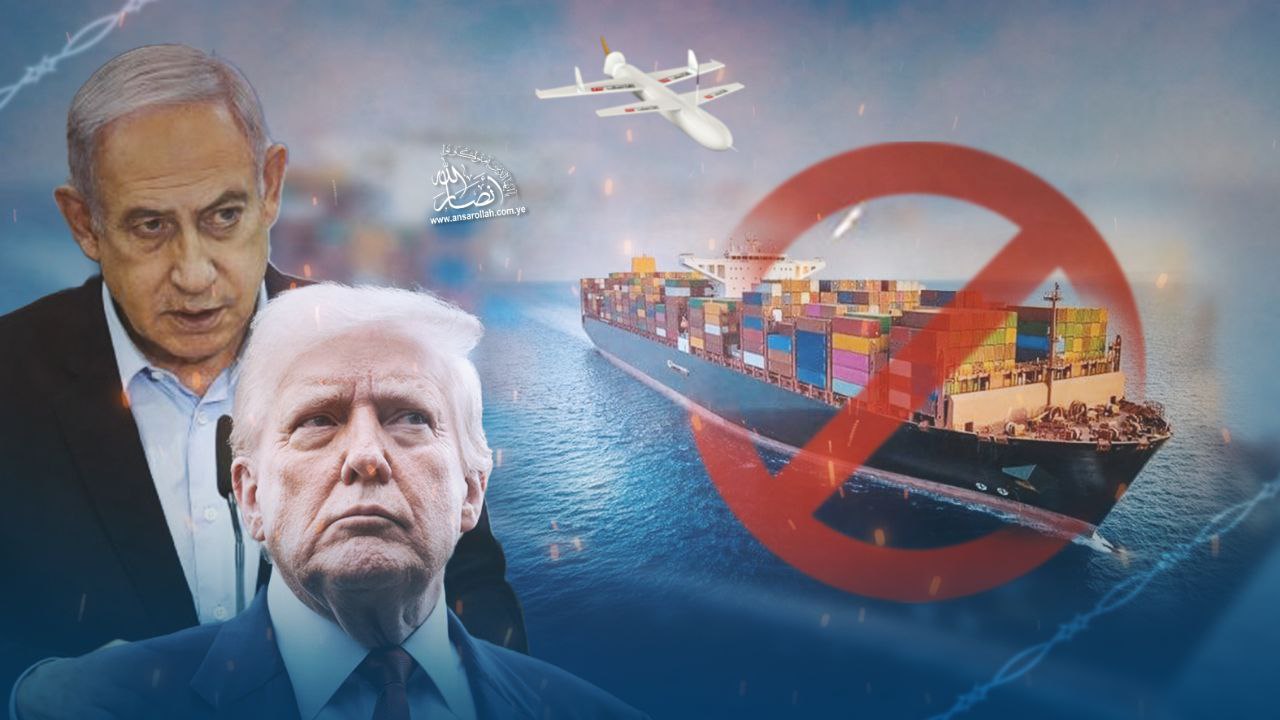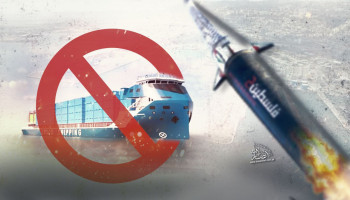Ansarollah Website - Yahya Al-Shami
The following investigative report reveals suspicious attempts by the enemy entity to circumvent the Yemeni legal ruling banning its navigation in the Red Sea, with the help of Arab and Islamic countries that contradict their official positions and support the crime, violating their national and religious commitments.
The Yemeni Blockade: A Moral Decision to Stop Genocide
Almost two years ago, the Yemeni Armed Forces announced a naval blockade on ships bound for the Zionist enemy's ports in the Red Sea, as a pressure measure to stop the war crimes and genocide committed by the entity against civilians in Gaza. Although the decision has dealt a devastating blow to enemy shipping, leading to the complete closure of the Umm al-Rashrash port and a rise in prices within the occupied entity, the investigation reveals that the enemy, with the help of Arab and Islamic countries, is attempting to circumvent this ban through devious methods that not only violate the Yemeni embargo decision, which is based on humanitarian and moral principles, but also violate the essence of international law and undermine humanitarian efforts to stop the genocide.
The Plan: Transporting Enemy Goods Through Arab Ports as a "Cover"
Previous Hebrew reports revealed a systematic plan to circumvent the Yemeni maritime embargo. This plan relies on the use of "intermediary ports" in Arab and Islamic countries, which record final destinations on bills of lading, while the actual destination is the ports of occupied Palestine.
According to a report published by the Hebrew newspaper "Mako" on December 10, 2023, the plan relies on unloading containers bound for enemy ports in Arab ports such as Por Said in Egypt, Damietta, and other ports in Turkey, Greece, and Cyprus. From these ports, the goods are transferred to smaller ships that continue the journey to enemy ports. Fake bills of lading are used to conceal the true destination, in addition to a series of procedures followed in maritime shipping, including switching off the identification device, misleading the final destination, obscuring the source, etc.
A shipping expert described the mechanism to the Hebrew newspaper: "Ships departing from China with goods destined for enemy ports will receive fake bills of lading" indicating that the containers are destined for the port of Piraeus in Greece. After docking in Greece, the containers are loaded onto a new, smaller ship bound for enemy ports.
Circumventing the Law: "Political" Bills of Lading Violate Yemeni Resolutions
This model is characterized by avoiding mentioning the final destination, "the enemy," in any ship or cargo data, which could reach to the Yemeni armed forces. This prevents ships from being targeted under the embargo. According to customs and international shipping expert Alad Gur-Aria, "A political bill of lading is a transport document used in trade between two countries with no relations," referring to an attempt to conceal the fact that the goods are bound for the enemy.
This circumvention constitutes a clear violation of the Yemeni resolution, which imposes a ban on all ships bound for or owned by the enemy entity. More seriously, it reveals the undeclared complicity of some Arab and Islamic countries, which allow their ports to be transformed into logistical platforms to support the enemy in violating the embargo.
Undeclared Partners in the Circumvention
What is surprising is that some Arab countries—which declare their support for the Palestinian cause—play a pivotal role in this fraudulent network. According to A report by the Hebrew business newspaper Globes, published on May 30, 2024, states that "a medium-sized shipping company based in Hong Kong called 'W Ships' offers enemy shippers a weekly import of shipments from China to the enemy via the Red Sea," while "carrying out a 'loading' operation in Egypt en route to the enemy.
The report explains that the process includes "transferring the goods to a third country (in this case, Egypt), modifying the bills of lading, loading the goods onto another ship, and then transporting them to enemy ports." This implies that Egyptian ports, specifically Por Said, play a pivotal role in this fraud, as the investigation will demonstrate in Part Two.
The Hebrew report explains that this process allows ships to continue sailing through the Red Sea and the Suez Canal, avoiding to sail around the African continent. Instead of extending the shipping journey from the East to the enemy by a month to a month and a half, the time is only increased by four to five days. A customs agent in the Israeli Ministry of Transportation believes that this step, despite its cost, is much lighter than the burden of shipping by sailing around Africa.
However, this solution is associated with costs. Additional costs include leasing additional ships and hiring new workers. According to the Mako report, this will increase the cost of transporting goods to the enemy and could result in higher final prices for consumers within the entity.
The investigation raises major questions about the suspicious roles highlighted by the Hebrew media and revealed with the start of the Yemeni blockade. It also raises questions about the truth behind the slogans and statements made by these countries in defense of the Palestinian cause, while simultaneously becoming accomplices in the war crimes committed by the enemy, by enabling it to circumvent the Yemeni naval blockade aimed at halting these crimes. Can these countries justify to millions of Muslims around the world their assistance to the Zionist entity in circumventing the naval blockade, which aims to halt war crimes?
Decisions by Major Shipping Companies
Maersk, the world's largest container shipping company, which controls 14.3% of the world's container shipping, has made it clear that it does not intend to send ships to the Red Sea anytime soon. Maersk CEO Vincent Clark described the attempt to return to the Red Sea as a "complex, costly, and difficult process" to redirect shipping lines to the Red Sea. This is the company's final announced position to date. The Chinese giant COSCO, the world's fourth-largest shipping company, has also decided to halt shipping to occupied Palestinian ports in light of the Yemeni ban.
The next investigative report in this series will focus on dismantling the logistics networks used by companies collaborating with the enemy, identifying the names and entities involved in this illegal operation, and exposing the ugly face of some countries that claim to support the Palestinian cause while working, in secret, to enable the enemy to continue its crimes.
#The_Zionist_enemy #The_American_British_aggression_against_Yemen
#US_is_the_mother_of_terrorism
#Al_Aqsa_flood







